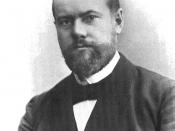Power is a central concept in sociology and, arguably, affects all aspects of social life. What do sociologists mean when they talk of power? What is power? Is power merely a zero-sum concept as Weber suggests!'Power' is a term typically intended to bring about both capacity and energy. The force or energy used to do work. Whereas, on the other hand 'Authority' refers to the power or right to give orders or make decisions in our society. Good afternoon, today I'm here to present my speech on Week 5, where the topic is Power & Authority. Firstly I'm going to further define what is power and authority in my talk. I'm also going to decide about what sociologists think when they talk about power in our contemporary society and later in my talk, further decide about different theorists of distribution of power in society as well.
'Power' is broadly defined as "the capacity to bring about change" (web definition via google).
It takes many forms, comes from many places, and is measured in many ways. In general, one could identify 'power' as the more or less narrow ability or potential to bring about significant change, usually in people's lives, through the actions of oneself or of others. Although, 'Authority' in contrast, "is the right to influence control or direct the actions of other people" (web definition via google). A contemporary example of this could be 'the government has the authority to pass laws', 'the police has the power in our society to arrest law-breakers'. Both power and authority are narrowly associated and are sometimes interchangeable, though not always this is the case.
According to Max Webber, there were three types of authority in society:Traditional Authority: it depends on established customs and traditions, habits, past practice. Contemporary example could be kings...


